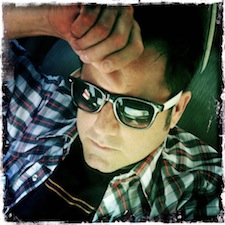Editorials Marco Collins — May 27, 2013 14:55 — 2 Comments
The Monarch Drinks With Marco Collins
Okay, so we just drank water. Well, I was finishing off an iced latte from a coffee place up the street. It was early. We met around 11am at Obasan, a quaint Japanese place in Queen Anne that has, coincidentally, my new favorite noodle dish: Yakisoba with tofu and no mushrooms. Marco Collins, the former Program Director for The End and expert with chopsticks, ordered the tuna rolls and teriyaki chicken.
“This is breakfast for me,” he tells me. The meal is a preface to a meeting he has scheduled with the Bumbershoot folks down the street. With Marco, possibilities abound.
So, how does one begin a conversation with someone famous and infamous in this city? Famous for breaking artists like Weezer, Beck, Presidents of the United States, Death Cab for Cutie. Infamous for sometimes overdoing things in his personal life. He was the first person to play Eddie Veddar on the radio, he represents Seattle music as a DJ in the Rock and Roll Hall of Fame, but most of all, Marco is an open book.
Wearing a plaid flannel shirt and jeans, hair cut short with a small coif, graced with big bright blue eyes, Marco begins talking about the new documentary he is working on, The Glamour & The Squalor, which details the 90s Seattle music scene through his eyes.
“We just got someone really awesome who’s agreed to score the film,” he admits. Marco, the night before, leaked a picture of this person on his Facebook page with the face blurred out. “There was like 20 messages when I woke up this morning trying to guess who it was.” He chuckles, going in for a bite of sushi.
I want to know what it feels like to be him, to walk with so much history in his bones. “You’re credited with breaking so many artists,” I say. “What did you hear in that music, what was the spark? How did you know these bands were great?”
He pauses for a moment. Then says, “I don’t know.” I wait for him to gather his thoughts. “I’ve just always been able to hear that. It’s funny, it doesn’t matter what job I do, I’m always doing the same job. Hearing something, promoting it, working for a record label, doing A and R. But I don’t know what it is. I’m just a fan of music. I like pop music. I grew up listening to Top 40 radio all the time, so I had that formula in my head. It’s totally fun. If I can sing something and remember it and if it plays a positive role in my life, then I love it.”
At this moment classical music pops up on the restaurant’s stereo. Marco lights up, alerted. “That’s so cool!” He points to the sound, which is everywhere. He turns back to the question. “I’ve just been able to hear that stuff early. It’s not just about access, no. Because if I didn’t have access to it then I’d hear it on my own at some point.”
Blessed with success in the 90s, Marco finds himself in a different place now, career-wise. “Do you have a sense of what the role of a DJ is supposed to be now?” I wonder. “Is it the same as then?”
“Oh hell no. It’s not the same at all, which is why I’m not doing commercial radio right now.”
Yes, times have changed. In Seattle, artists talk frequently about how to get work out there in the world to be heard. It’s a struggle between making the best work one can coupled with the Wild West atmosphere of the internet age. Marco, though, adds his own wrinkle to the mix: he has battled with drugs and alcohol for much of his adult life.
Different times aside, the dude is in the Hall of Fame. “What is that like?”
“It’s crazy, man. The only DJs that represent the Seattle area there are Pat O’Day and myself,” he says. “You know, Pat and I have become friends over the past year. I totally see now what we had in common. I can see the thread of the way he thinks. He thinks like a musician. He’s a crazy fucker! This is the thing that I love about Pat: he told me that he had a rule with his DJ’s back in the day when he was Programming Director. His DJ’s, when they went on the air, had to get in the key of the song. So if the song was kicking, they had to be in the same key, the same energy. I think he even had a tuner in the studio so they could hear the pitches. The reason that works—I’ve always done that anyway, because I play off the emotion and work off that—is because it’s pure excitement.”
Working in the 90’s, Marco lived in Capitol Hill. He kept mostly to The End’s broadcasting building and his apartment six blocks away—frequenting only a few clubs in Capitol Hill and downtown. “Back then, I didn’t know where Issaquah was. I didn’t know how to pronounce any of those town names. But now I ride the bus everywhere. Back then I just took cabs. I worked in my little tower and went to clubs, that’s all I did. For seven years! That’s fucking ridiculous!”
I commiserate with him. In my first seven years in Seattle I rarely deviated from my path between work and where I lived in Capitol Hill. Only now, having begun a new relationship, do I feel myself broadening out. “I never went to Portland once!” he tells me. I nod. It’s good to grow up.
So what now? Where, in the opinion of this world-famous DJ, is Seattle going, artistically?
“I don’t know that either. I ask that of people all the time. What’s the thread?” Perhaps inevitably, the rapper Macklemore comes up in our conversation. “I think,” Marco says, classical music still going, our plates now almost empty, “Macklemore is talented. I just—I don’t know if he is leading the charge of the new sound.”
“Does there have to be a sound, in your mind?” I ask. “I suppose the Grunge era had a sound, but—”
“Then, there was a sound code, as it were. Not all bands sounded the same but they were all heavy. It wasn’t until later—I’ve kind of broken it into categories: the heavier stuff came out in the early 90’s; then you had this sort of eccentric pop thing happening with Modest Mouse and Death Cab and The Presidents—this indie-flavored pop that changed things completely; and now you have the Appalachian folk movement that’s starting to get big.”
We take a moment to laugh, remembering that stage between the indie-flavored pop music of Modest Mouse and the newer folk music from, say, The Head and The Heart. We share a mutual (though almost secret) appreciation of the Limp Bizkit era. “I still like their first album,” he says, grinning. “Listening back, you’re embarrassed to like it, but it’s awesome!”
Our server, demure with jet-black hair, comes to our table. She clears my plate (I’ve nearly licked it clean) and Marco asks to take the rest of his food to go. It’s funny, the matter of food holds its own demons for both of us. I’ve battled weight issues most of my life and Marco, heightened by the production of this new documentary, is constantly seeing new and old footage of himself, pictures and video that remind him of difficult times, times when those aforementioned drugs and alcohol, as well as food, augmented his appearance.
“My thing is,” he says, “I work a lot better when it’s just audio. This fucking film thing—I worry about all that shit. I see a few scenes and it’s just like, “Fuck, no. You’re not putting that scene in.” I had to work with them on the trailer and ask, “Please take that scene out, I know you think it’s the best scene in the world, but I look like shit.” I’m super self-conscious about that stuff. I’m super critical of myself. It’s not always rad seeing yourself thirty pounds heavier than you remember. I struggle with—we have a rule that I’m not going to watch any of the film until it’s done.
Marco, who is also now comfortably out as a gay man, speaks to the difficulties of the social temperature through the 90’s and 2000’s. It wasn’t until recently, he notes, that being gay was mostly acceptable. He recalls the night when Referendum 74 passed, making same-sex marriages legal in the state of Washington. “I was out dancing in the streets!” he says. “That will be in the movie, but I haven’t seen the scene yet. They won’t let me see it. Part of this is going to have to be me saying, “I surrender.” And just let things happen.
Careers are a struggle but so are personal lives. Meeting people, letting people in, is not easy. And certain dating mediums don’t help the cause. “Nothing says let’s just hook up for a night then a name like Grindr!” he says. “It’s not like, “Hey, let’s meet, see if we’re into the same art, music, movies.” It’s called Grindr! I’ve had success with other internet dating in the past, but I’m not in a place right this minute where I’m confident enough to date. I always think I need to be thinner, smarter, better. But then I also look back and think about times when I was worried about myself and I think, “Why was I worried about that at that time?” I need to get over some hang-ups so I can progress. It’s hard, man.
We sit together for a few more minutes. We talk about his new project putting on shows at Vermillion, we talk about the band youryoungbody, which he loves. We talk about how I met my girlfriend and we talk about his movie a bit more. It’s an easy conversation sitting with him, he is as willing and open as any person I’ve met.
Soon, though, the bill comes and I pay it. I am glad to, thankful to. We exit the restaurant together, it’s almost 1pm now. I see him in the light of the afternoon. Marco Collins is a tall fellow. He has a tanned, almost rough complexion, and is clean-shaven. His eyes shimmer. He is full of energy, a dynamic individual. This man is responsible for thousands, if not millions, of people hearing music from Seattle musicians over the last 20 years. We shake hands and I express my gratitude for him sharing his time. We say we hope to see one another in the future. He walks down Mercer Street.
2 Comments
Leave a Reply
The answer isn't poetry, but rather language
- Richard Kenney





Best piece of yours I’ve read. Didn’t want it to end. I think you like it too, because your better pieces seem to be longer. I wish I had access to something of yours that wasn’t an interview, i e not journalism, but I suppose wearing an Editor’s hat precludes showing a little ankle. Is your writing available in some venue? I especially like the way you combine candor with a light, even breezy touch. It has an easy flow that is conversational in its fluency even when not reporting conversation. It’s writing that seems like speech, in short, not an easy style to come by for most of us. Color me a little green
RLC – Stuff can be found online. Don’t hold me responsible for whether you like it or not! Thanks again for reading!